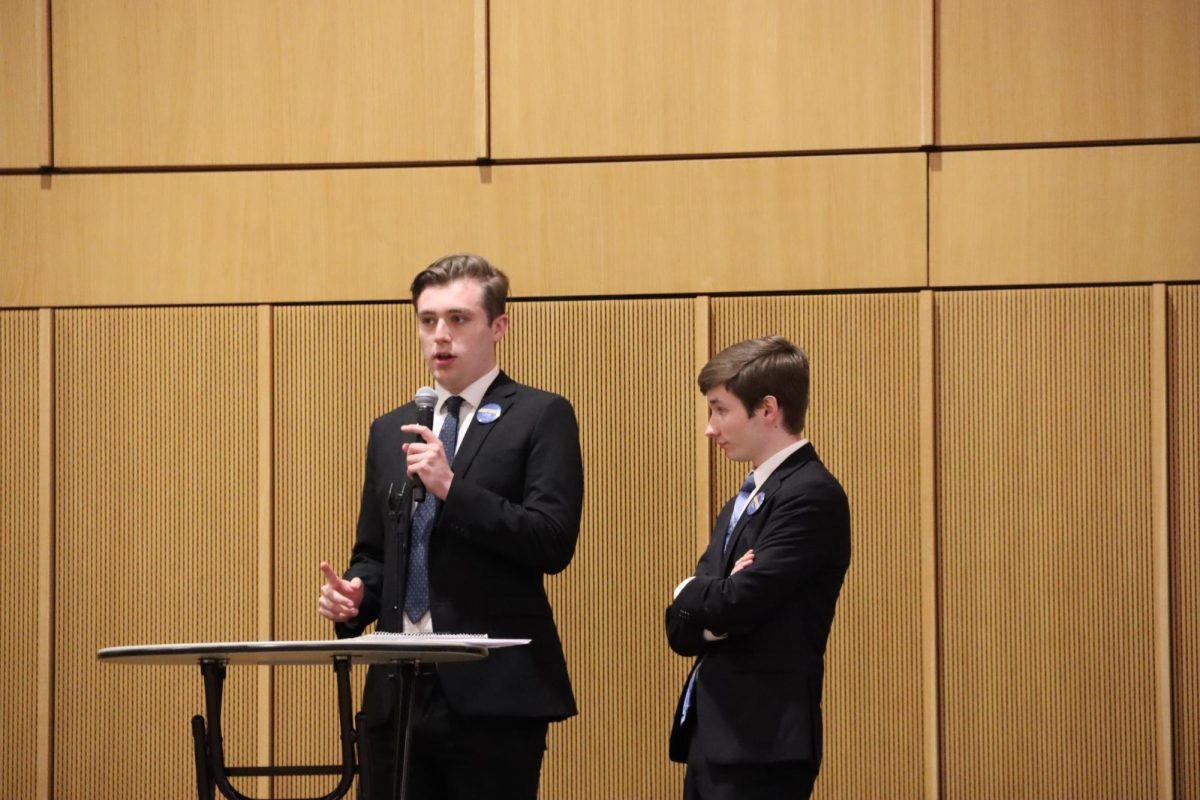Colin Humphries and Dale Leone are running for president and vice president of the University of Massachusetts Student Government Association, campaigning on increased affordability of tuition and other college expenses and a closer connection with the student body.
Leone, a junior history major, has been a conduct advisor, someone who advocates on behalf of students and their rights involved in conduct processes, for two consecutive years. He has been an SGA senator for one semester.
Humphries, a junior political science major, has been an SGA senator since his freshman year and serves as the chair of the undergraduate services committee. He cited his continued experience as a residence assistant in a freshman dorm and his involvement on the executive board of the UMass Young Democrats, saying both these experiences have given him insight into problems RSO’s (Registered Student Organizations) and students at-large face.
“I understand the difficulties that many RSOs have securing space, securing their budget,” Humphries said.
“For a lot of students, the RSOs are really a huge integral part of their campus life and if they’re not able to operate properly because of stuff on our end, to me that’s completely unacceptable and it’s our responsibility to address that,” he added.
Humphries and Leone want to improve the budget process by prioritizing communication and increasing the pool of resources available for student organizations.
“Obviously we don’t want to raise these student activities fee, like that’s not something that anybody wants to do. However, if it becomes necessary in order to properly fund all of our RSOs, then that is something we will certainly explore,” Humphries said.
“We have RSOs that request 11 million dollars, and we have about four to five million dollars to give, so there’s a simple math problem where we don’t have enough money to give,” Leone said. “We also have to make sure that we have enough money to fully fund the campus community.”
The ticket wants to increase the visibility of SGA on campus, building a better relationship with organizations in the process.
“If we’re out in the community, we’re able to hear what people want and their needs and so I think the biggest thing that we should do as leaders of the SGA is ensure that it starts from the top, meaning us, actually out in the community here where people want and [learning] what they need from us,” Leone said.
Both expressed a concern for a lack of internal transparency within SGA, specifically on big picture financial matters including potential reform to the Student Activities Trust Fund.
“A lot of SGA officers, including myself, are not completely even aware that this process is currently taking place, or these decisions are being made,” Humphries said. “I think it’s important that, you know, financial leadership is transparent about what is going on with the Student Activities Trust Fund.”
The pair also supports a ballot measure that would call for the University to cut “special and exclusive financial relationships in the defense industry, from defense companies and military contractors.”
“I think that’s a small but significant thing that we can do as a University so that we are no longer affiliating ourselves with companies that are making weapons of mass destruction and weapons that kill other people and kill, you know, have been used in situations such as in Gaza to really just commit genocide and take a lot of lives,” Humphries said.
However, Humphries and Leone don’t think this should be an immediate cut of ties, as this could be too disruptive for students. Instead, they want the transition to initially focus on creating opportunities for students as opportunities with military contractors decrease.
The pair also wants to focus on housing issues for students, by “pushing admin to begin developing plans and pushing the state to begin developing plans to either cap admissions or provide more housing for students,” Humphries said.
Leone also pointed to two resolutions SGA recently passed, supporting the Debt-Free Future Act and the Cherish Act, as examples of ways SGA can “encourage the administration through our resolutions to encourage state leaders through our resolutions to take action on certain initiatives.”
At the debate, the ticket stressed their comparative experience within SGA. However, the pair doesn’t view themselves as part of the SGA establishment despite their extensive experience.
“I’m still the same person I was when I got in here,” Humphries said. “I’m still a student. I live on campus. I live amongst students. I regularly go to the dining halls. I pay tuition. I struggle to pay tuition at times. I park on campus. I utilize all the different services on campus that are utilized by everyday students. And, you know, I tried to brand myself as somebody who is amongst the students. I’ve never been afraid to go against the grain.”
“There were a lot of times where people in the SGA leadership… didn’t want to see me go places, they really just didn’t want to see me do things because I disagreed with them or because I posed a challenge to their agenda or because I stood on my ground and I defended the students that elected me to represent them,” he added. “We are going to be just as receptive and just as much of fighters for the students as we have been since the first day that we entered the SGA.”
Daniel Frank can be reached at [email protected].




















